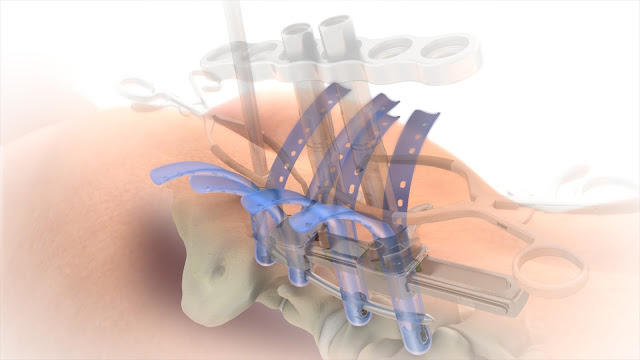Minimally Invasive Spine Surgery and Artificial Disc Replacement
The Spine is a part of our body which holds up our weight
and makes our body upright. The Spinal cord is made up of 24 immovable parts
and it is the most important part of our body because, without the spinal cord,
the body cannot communicate with the brain. Spinal cord acts as a bridge
between the body and the brain which are connected through nerve fibers.
 |
| Artificial Disc Replacement |
Alignment of the body is important and spine is responsible
for that. Alignment is said to be good when your head, shoulders, spine, hips, knees, and ankles line
with each other. A bad posture leads to a bad alignment which further results
in a hump in the spine. Spinal cord and our brain are also known as our body’s
central nervous system in which every command from the brain will travel through
the spine to reach its destination.
What is Artificial
Disc Replacement and who needs it?
Artificial Disc
Replacement is a surgery in which a painful disc is replaced with an
artificial one. Artificial discs can be replaced from anywhere in the spine.
The discs are made into exact replica so that they mimic the original one. A
serious injury to spine like falling from stairs or falling down from the chair
or an injury while playing sports or a serious back pain are some of the major
causes that lead to Artificial DiscReplacement.
Degenerative disc
disease is said to be diagnosed when the degeneration of the invertible discs
is seen. This can be caused by daily stress or minor injuries while playing or
just accidental. An injury leads to the loss of water from the annulus which
further weakens it. As the annulus begins to get weak, the space between the
discs shortens down and starts to collapse. This results in the pressure and
the pain that is being put on the nerves which in the end weakens them. This
condition can lead to chronic back and neck pain which can be cured by Artificial
Disc Replacement.
Minimally Invasive
Spine Surgery
Minimally Invasive
Spine Surgery is done with a minimum opening in the spine are and using
special instruments such as robotic hands to reach the affected area. Because
of the advanced technology, the traditional method of spine surgery is kept
behind and Minimally Invasive Spine
Surgery is opts as the incisions made are about 5-6 inches wide. This type
of surgery is less risky and doesn’t require too many stitches. This surgery is
done to decompress the nerves and the nerve endings which are either pinched or
twisted and causes a lot of pain. After
this surgery, the pressure is reduced or lifted up and pain is minimized too. Stabilization
of the spine is also needed and it is done with advanced technology or robotic
hands. Minimally Invasive Spine Surgery makes
small incisions, less bleeding and shorter stay at the hospital.
These
surgeries are the last resort for your chronic pain or spine injuries. These are
done when the pain medicines and non-surgical treatments fail to impress.

I have long felt a special connection with herbal medicine. First, it's natural, Charlie attended the same small college in Southern California - Claremont Men's College - although he dropped out of school to enroll in the Julliard School of Performing Arts in New York. York. Had he been to Claremont, he would have been senior the year I started there; I often thought that was the reason he was gone when he discovered that I had herpes. So, my life was lonely, all day, I could not stand the pain of the outbreak, and then Tasha introduced me to Dr. Itua who uses her herbal medicines to cure her two weeks of consumption. I place an order for him and he hands it to my post office, then I pick it up and use it for two weeks. All my wound is completely healed no more epidemic. I tell you honestly that this man is a great man, I trust him Herbal medicine so much that I share this to show my gratitude and also to let sick people know that there is hope with Dr. Itua. Herbal Center.Dr Itua Contact Email.drituaherbalcenter@gmail.com/Whatsapp ... +2348149277967
ReplyDeleteHe cures.
Herpes,
Prostate
Breast Cancer
Brain Cancer
CEREBRAL VASCULAR ACCIDENT.
,Endomertil Cancer, cerebrovascular diseases
Hepatitis,Glaucoma., Cataracts,Macular degeneration,Cardiovascular disease,Lung disease.Enlarged prostate,Osteoporosis.Alzheimer's disease,
Dementia.Tach Disease,Shingles,
Lung Cancer, Leukemia Lymphoma Cancer,
Lung Mesothelioma Asbestos,
Ovarian Cervical Uterine Cancer,
Skin Cancer, Brain Tumor,
H.P.V TYPE 1 TYPE 2 TYPE 3 AND TYPE 4. TYPE 5.
HIV,Arthritis,Amyotrophic Lateral Scoliosis,Fibromyalgia,Fluoroquinolone Toxicity
Cervical Cancer
Colo-rectal Cancer
Blood Cancer
SYPHILIS.
Diabetes
Liver / Inflammatory kidney
Epilepsy